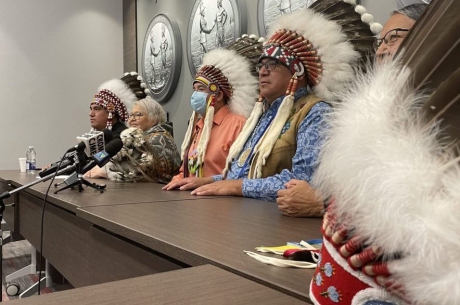Columns
You are here
Saskatchewan First means Saskatchewan worst for Indigenous rights

March 21, 2023
On March 16 Scott Moe’s far-right Saskatchewan Party government passed Bill 88, the “Saskatchewan First Act”. Inspired by Alberta’s controversial legislation, the act supposedly gives the province control over all resource extraction.
This allows them to claim jurisdiction over “Crown Lands” – unceded Indigenous territory. Auctioning off large block of these lands, and the resources beneath them, is now taking place.
When the act passed third reading in the legislature, more than 100 Indigenous and Metis leaders rose when opposition votes were called, unanimously standing in silent protest. They rightly argue that the act violates their treaty rights and traditional use rights over unceded land. The Federation of Sovereign Indigenous Nations (FSIN) says it will begin legal challenge immediately.
The province in turn argues that the Natural Resource Transfer Agreement of 1930 over-rides Treaty and traditional rights. That agreement put the land in trust with the federal government, with the province in turn getting payment for resource extraction. The Saskatchewan First Act seeks to remove the federal government from the equation.
Indigenous activists rightly argue that they never agreed to the 1930 Agreement. In fact, the apartheid-like restrictions of the Indian Act of the time prohibited Indigenous people from organizing, meeting to discuss issues or conduct ceremonies, or even hiring lawyers to represent them in negotiations.
Successful or not, court case will be slow and drawn out. The province is moving fast to create a resource bonanza for mining corporations that donate to and lobby its MLAs.
This sets up a volatile situation in which Indigenous communities will have no choice but to use blockades and direct action protests to defend their rights on their own land. Similar circumstances are brewing in Albertaand Ontario , where far-right conservative governments are rushing to cash in on unlimited resource extraction.
Treaty rights expert Russ Diabotold the press: “Any province you could look to, they’re making decisions which are pushing First Nations aside.”
He warned: “If you’re not including key people who are using the land, who have constitution-protected rights and internationally recognized rights, it’s going to be a problem.”
While the federal government, at least rhetorically, pushes for reconciliation the provinces instead push for racist exclusion and confrontation. They are gambling that now, in the wake of pandemic shutdown and affordability crisis, is their best opportunity to break the growing support for Indigenous right that was shown 3 years ago by the Shut Down Canadamovement.
We need to prepare to organize solidarity for Indigenous land and treaty rights at a moment’s notice. We can rekindle the alliances of 3 years ago. This could be a long, hot summer of protest and struggle.
Section:










